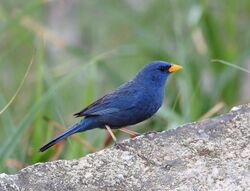Biology:Porphyrospiza
| Porphyrospiza | |
|---|---|

| |
| Blue finch (Porphyrospiza caerulescens) | |
| Scientific classification | |
| Domain: | Eukaryota |
| Kingdom: | Animalia |
| Phylum: | Chordata |
| Class: | Aves |
| Order: | Passeriformes |
| Family: | Thraupidae |
| Genus: | Porphyrospiza Sclater, PL & Salvin, 1873 |
| Type species | |
| Tanagra caerulescens Wied, 1840
| |
| Species | |
|
3, see text | |
Porphyrospiza is a genus of seed-eating South American birds in the tanager family Thraupidae.
Taxonomy and species list
The genus Porphyrospiza was introduced in 1873 by the English ornithologists Philip Sclater and Osbert Salvin to accommodate the blue finch.[1] The genus name combines the Ancient Greek porphura meaning "purple" with spiza meaning "finch".[2] The genus formerly included only a single species, the blue finch. The band-tailed sierra finch and the carbonated sierra finch were formerly placed in the genus Phrygilus. They were moved to Porphyrospiza when a molecular phylogenetic study published in 2014 found that Phrygilus was polyphyletic and that these two species were closely related to the blue finch.[3][4][5]
The genus now contains three species:[5]
| Image | Scientific name | Common Name | Distribution |
|---|---|---|---|
 |
Porphyrospiza caerulescens | Blue finch | Brazil and northeastern Bolivia |
 |
Porphyrospiza alaudina | Band-tailed sierra finch | Argentina, Bolivia, Chile, Ecuador, and Peru |
 |
Porphyrospiza carbonaria | Carbonated sierra finch | Argentina |
References
- ↑ Sclater, P.L.; Salvin, Osbert (1873) (in Latin). Nomenclator avium neotropicalium : sive avium quae in regione neotropica hucusque repertae sunt nomina systematice disposita adjecta sua cuique speciei patria accedunt generum et specierum novarum diagnoses. London: Sumptibus Auctorum. pp. 30, 155.
- ↑ Jobling, James A. (2010). The Helm Dictionary of Scientific Bird Names. London: Christopher Helm. p. 315. ISBN 978-1-4081-2501-4.
- ↑ Burns, K.J.; Shultz, A.J.; Title, P.O.; Mason, N.A.; Barker, F.K.; Klicka, J.; Lanyon, S.M.; Lovette, I.J. (2014). "Phylogenetics and diversification of tanagers (Passeriformes: Thraupidae), the largest radiation of Neotropical songbirds". Molecular Phylogenetics and Evolution 75: 41–77. doi:10.1016/j.ympev.2014.02.006. PMID 24583021. https://digitalcommons.lsu.edu/cgi/viewcontent.cgi?article=3613&context=biosci_pubs.
- ↑ Burns, K.J.; Unitt, P.; Mason, N.A. (2016). "A genus-level classification of the family Thraupidae (Class Aves: Order Passeriformes)". Zootaxa 4088 (3): 329–354. doi:10.11646/zootaxa.4088.3.2. PMID 27394344.
- ↑ 5.0 5.1 Gill, Frank; Donsker, David; Rasmussen, Pamela, eds (July 2020). "Tanagers and allies". IOC World Bird List Version 10.2. International Ornithologists' Union. https://www.worldbirdnames.org/bow/tanagers/. Retrieved 20 November 2020.
Wikidata ☰ Q15729194 entry

